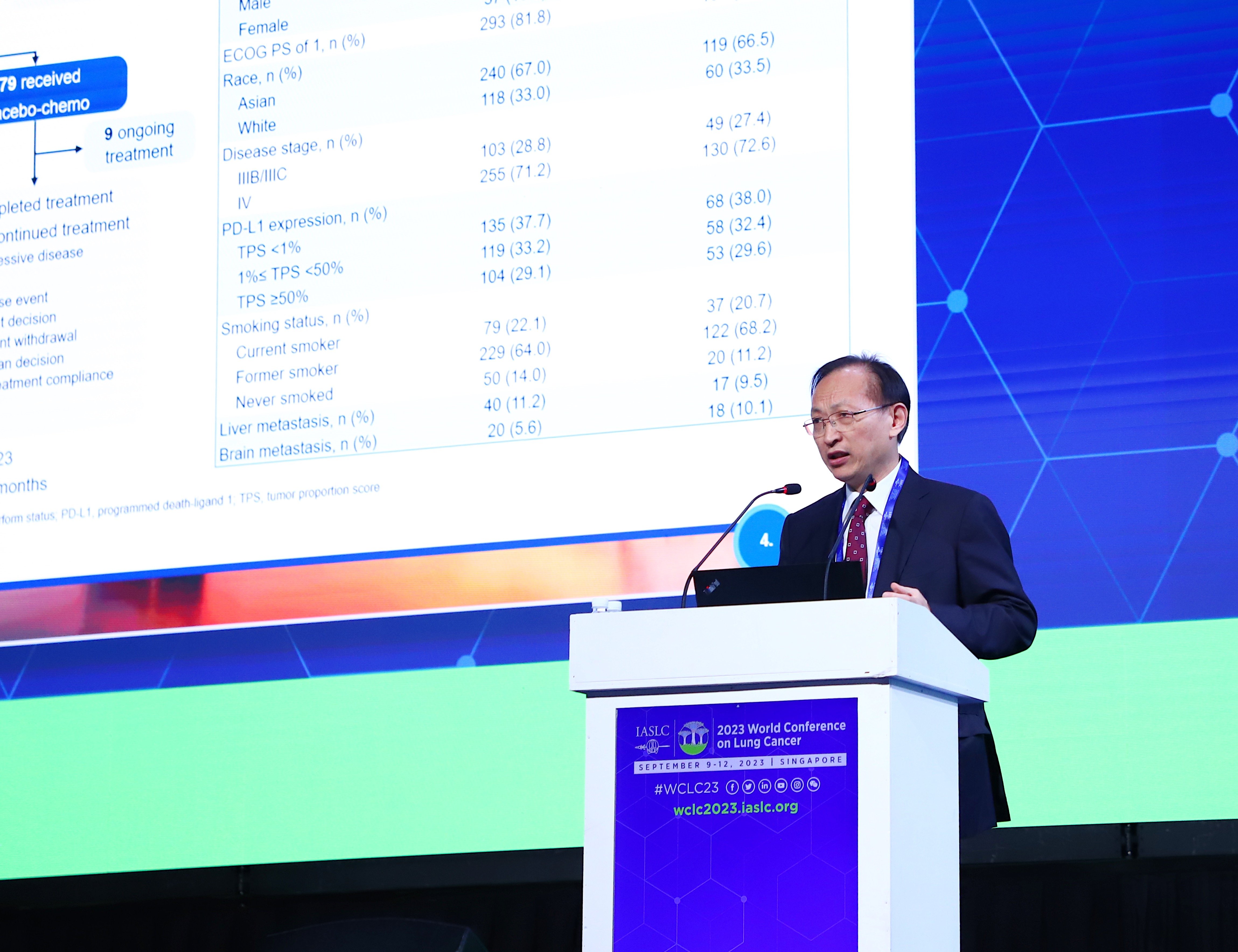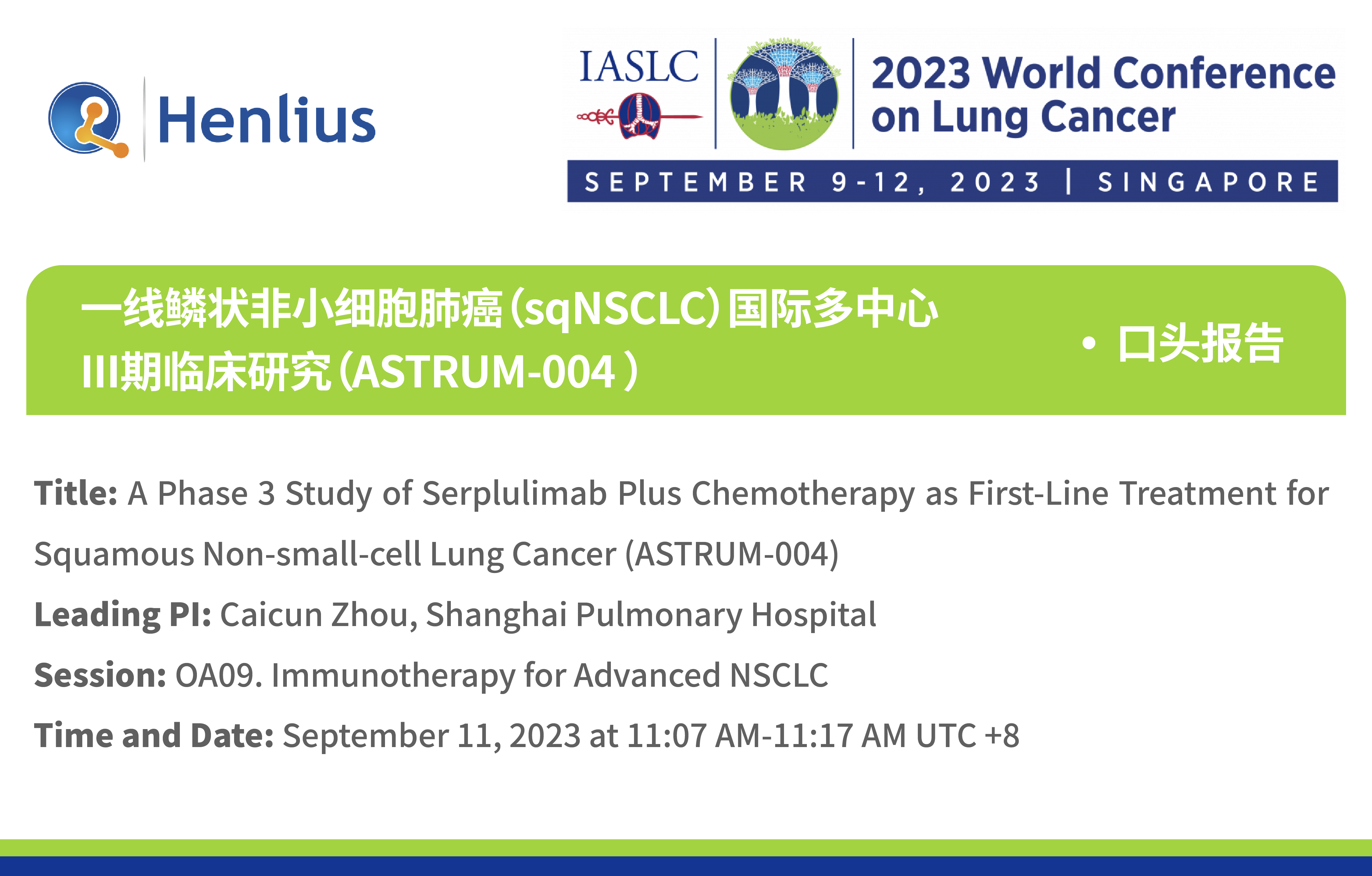On September 11, 2023, the study results of ASTRUM-004, Henlius’ pivotal phase 3 clinical study of anti-PD-1 mAb HANSIZHUANG (serplulimab) plus chemotherapy as first-line treatment for previously untreated locally advanced or metastatic squamous non-small-cell lung cancer (sqNSCLC), were released at the 2023 World Conference on Lung Cancer (“WCLC 2023”) hosted by the International Association for the Study of Lung Cancer. The results were orally presented by Professor Caicun Zhou from Shanghai Pulmonary Hospital, the leading principal investigator of ASTRUM-004.

HANSIZHUANG is Henlius’ first innovative product, as well as the first and only anti-PD-1 therapy approved for the treatment of small cell lung cancer (SCLC). ASTRUM-004 is a randomized, double-blind, international multicenter phase 3 study to compare the clinical efficacy and safety of serplulimab plus chemotherapy versus chemotherapy in patients with locally advanced or metastatic sqNSCLC who have not previously received systemic treatment. The study was conducted in various countries, including China, Poland, and Turkey, and enrolled 537 patients. Current data showed that serplulimab significantly improved survival with a manageable safety profile in previously untreated locally advanced or metastatic sqNSCLC patients. Previously in 2022, the new drug application (NDA) of serplulimab for the treatment of sqNSCLC has been approved by the National Medical Products Administration (NMPA) based on the results of ASTRUM-004.

Title
A Phase 3 Study of Serplulimab Plus Chemotherapy as First-Line Treatment for Squamous Non-small-Cell Lung Cancer (ASTRUM-004)
Study design
In this randomized, double-blind, international multicenter phase 3 study, patients with histologically or cytologically confirmed stage IIIB/IIIC or IV squamous non-small-cell lung cancer (sqNSCLC) and no prior systemic therapy were randomized 2:1 to receive intravenous serplulimab 4.5 mg/kg or placebo (up to 35 cycles) in combination with chemotherapy (carboplatin and nab-paclitaxel, 4-6 cycles) in 3-week cycles. Randomization was stratified by PD-L1 expression level (tumor proportion score [TPS] ≥50% vs. 1%≤ TPS <50% vs. TPS <1%), race (Asian vs. non-Asian), and disease stage (stage IIIB/IIIC vs. IV). The primary endpoint was independent radiological review committee (IRRC)-assessed progression-free survival (PFS) per RECIST v1.1. Secondary endpoints included other efficacy measures, safety, and biomarker explorations.
Results
Here we report the results from the pre-specified final analysis of overall survival (OS), which is also an updated analysis of PFS and safety. As of January 31, 2023, a total of 537 patients were randomized to serplulimab-chemotherapy group (n=358) or placebo-chemotherapy group (n=179). The median age of enrolled patients were 63.0 years, and 90.9% of patients were male.
With a median follow-up of 31.1 months, the PFS benefit of serplulimab-chemotherapy vs. placebo-chemotherapy was maintained (IRRC-assessed, median, 8.3 vs. 5.7 months; hazard ratio [HR] 0.55, 95% CI 0.43-0.69). The HR for PFS consistently favored serplulimab-chemotherapy group across the prespecified subgroups. OS was significantly prolonged with the addition of serplulimab (median, 22.7 vs. 18.2 months; HR 0.73, 95% CI 0.58-0.93; p=0.010, crossing the significance boundary of 0.046).
127 (35.5%) and 57 (31.8%) patients in the respective group reported grade ≥3 adverse events related to serplulimab or placebo, most commonly: neutrophil count decreased (14.8% vs. 14.5%), anemia (12.0% vs. 10.6%), and white blood cell count decreased (10.1% vs. 11.2%). 106 (29.6%) and 31 (17.3%) patients reported immune-related adverse events, most frequently: hypothyroidism (6.4% vs. 0.6%), rash (5.0% vs. 1.1%), and immune-mediated lung disease (4.2% vs. 0.6%).
Conclusion
Compared with placebo, serplulimab significantly improved survival with a manageable safety profile in previously untreated locally advanced or metastatic sqNSCLC patients. Serplulimab plus chemotherapy could be a promising treatment option for this patient population.
About IASLC WCLC
Founded in 1972, the International Association for the Study of Lung Cancer (IASLC) is an international organization of more than 8,000 lung cancer specialists from 100+ countries. IASLC members work towards developing and promoting the study of etiology, epidemiology, prevention, diagnosis, treatment, and all other aspects of lung cancer. IASLC’s mission is to enhance the understanding and education of lung cancer to scientists, members of the medical community and the public. In addition to the annual meeting, the IASLC publishes the Journal of Thoracic Oncology, a prized resource for medical specialists and scientists who focus on the detection, prevention, diagnosis, and treatment of lung cancer.
The IASLC World Conference on Lung Cancer (WCLC) is the largest international gathering in the field of lung cancer and thoracic oncology. With a stellar scientific program and well-known faculty, WCLC highlights the most advanced treatments, clinical trials and studies in thoracic oncology and lung cancer.
About HANSIZHUANG
HANSIZHUANG (recombinant humanized anti-PD-1 monoclonal antibody injection, generic name: serplulimab injection) is the first anti-PD-1 mAb for the first-line treatment of SCLC. Up to date, 3 indications are approved for marketing in China, 2 marketing applications are under review in China and the EU, and more than 10 clinical trials are ongoing across the world.
HANSIZHUANG was launched in March 2022 and has been approved by the NMPA for the treatment of MSI-H solid tumours, squamous non-small cell lung cancer (sqNSCLC) and extensive-stage small cell lung cancer (ES-SCLC). Its marketing applications of the first-line treatment for esophageal squamous cell carcinoma (ESCC) and ES-SCLC are under review by the NMPA and the EMA, respectively. Focusing on lung and gastrointestinal cancer, the synergy of HANSIZHUANG with in-house products of the company and innovative therapies are being actively promoted. It has successively obtained clinical trial approvals in China, the U.S., the EU and other countries and regions to initiate more than 10 clinical trials on immuno-oncology combination therapies in a wide variety of indications. As of now, the company has enrolled more than 3,600 subjects in China, the U.S., Turkey, Poland, Georgia and other countries and regions, and the proportion of Whites is over 30% in two MRCTs, making HANSIZHUANG an anti-PD-1 mAb with one of the largest global clinical data pools. The results of 3 pivotal trials of HANSIZHUANG were published in the Journal of the American Medical Association (JAMA), Nature Medicine and the British Journal of Cancer, respectively. Furthermore, HASIZHUANG was recommended by the CSCO Guidelines for Small Cell Lung Cancer, the CSCO Guidelines for Non-Small Cell Lung Cancer, the CSCO Guidelines for Esophageal Cancer, the CSCO Guidelines for Colorectal Cancer, the CSCO Clinical Practice Guidelines on Immune Checkpoint Inhibitor, the China Guidelines for Radiotherapy of Esophageal Cancer, and other definitive guides, providing valuable references for clinical diagnosis and treatment of tumours. On the other hand, serplulimab was granted orphan drug designations by the FDA and the EC for the treatment of SCLC, and its bridging head-to-head trial in the United States to compare HANSIZHUANG to standard of care atezolizumab (anti-PD-L1 mAb) for the first-line treatment of ES-SCLC is well under way.
